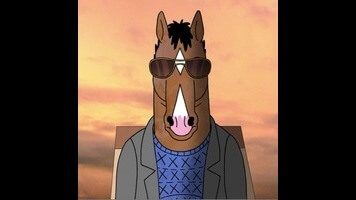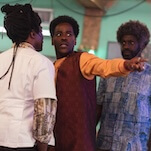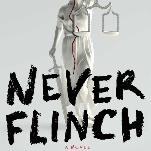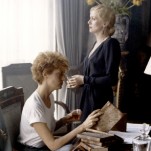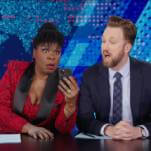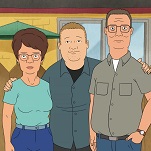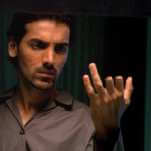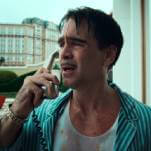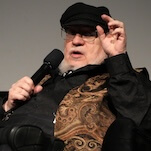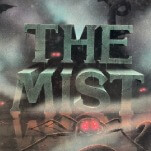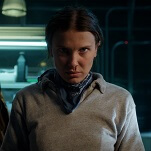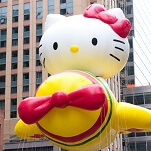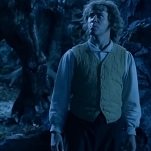From the very beginning, “Escape From L.A.” warns you not to get comfortable. The ending of “Yes And,” which showed BoJack driving away from his toxic life in Los Angeles, was more hopeful for BoJack than not. He not only got to New Mexico in one piece, but he found the woman who liked him before he was famous, the woman who made him wonder, “what if?” But just like when she said she doesn’t actually live in that idyllic Maine cottage he’s always imagined at Herb’s funeral, Charlotte immediately sets BoJack straight. No, she doesn’t care about this turquoise crap, and no, she hasn’t been waiting for him. Thirty years later, Charlotte has a family, and BoJack is once again left out in the cold wondering what in the hell he’s been doing with his life. It’s jarring after the seemingly optimistic ending “Yes And,” but it’s not exactly surprising. The real surprise is when “Escape From L.A.” uses one of Bojack Horseman’s abrupt cuts to the future, and it’s not just twenty minutes later.
Two months later, BoJack is still in New Mexico, slinging up pancakes and sleeping in the driveway in the boat he bought at a fictional boat show. (BoJack really should be better at lying by now.) His life with Charlotte’s family is picture perfect, which the episode drives home with fake sitcom credits that deliberately echo those of Horsin’ Around. As with everything good in BoJack’s life, though, this happy honeymoon period has an ominous cloud hovering over it. This life isn’t sustainable; he still has feelings for Charlotte; he’s getting awfully close with her teenage daughter. It’s only a matter of time until BoJack realizes this latest escape isn’t a permanent fix. Once that happens, there’s no telling just how badly he’ll self-destruct—or how badly he’ll hurt someone else.
Choosing a cover photo for this review was almost impossible. At first, I thought that was because there wasn’t possibly one image that could sum up just how lost BoJack is during his “Escape from LA”—until I realized that every single frame could do just that. There’s BoJack sitting at Charlotte’s table with her family, grimacing through breakfast when he realizes that not everyone got stuck like he did. There’s BoJack standing at Charlotte’s table with her family, whipping up breakfast with a manic grin, two months after showing up at Charlotte’s doorstep. There’s BoJack teaching teenagers how to drink, realizing he needs to be an adult for them, and backing away in a hurry. There’s BoJack making a move on Charlotte, desperately trying to get her to run away with him, desperately trying to reclaim the speck of happiness he felt thirty years ago. There’s BoJack getting rejected. And then there’s BoJack, speeding back to LA on the good ship “escape from LA,” face blank and shades on. The animation for that shot, and the hairpin turn to a silhouetted profile, is particularly gorgeous. If there ever were a BoJack Horseman biopic, this would certainly be the most coveted shot.
Most tempting was the final shot, where BoJack gets back to his Los Angeles house and it’s a total pit. As he wades through the cans and bongs and filth, the first assumption is that this must be Todd’s doing—and then he gets to the balcony and sees Diane. These two have been in a dead heat for this season’s most prominent downward spiral; it’s only fitting that they end up finding each other at the bottom.
But in the end, all these significant moments are still nothing compared to the one I ended up choosing, the one that makes this episode so crucial and so brutal to watch. This is the moment where BoJack embraces the worst parts of himself, resigns himself to being broken—and devastates people he truly cares about.
BoJack and Charlotte’s teenage daughter Penny bond from the beginning, when he takes her out for a driving lesson and they both share more about themselves and their insecurities than they meant to. BoJack is a stunted adult who just needs someone, anyone, to hear that he’s not okay; Penny is excited that an adult cares about her minutiae and doesn’t belittle her for it. When she and BoJack started to get along in the car, there was an alarm bell that went off in the back of my head that went something like, “ohhhh no, she looks so much like Charlotte, danger danger danger, please don’t do that, DANGER.” And this script from Joe Lawson (who also wrote “After the Party”) knows it. Every subsequent scene with them sidles right up to the line, but never exactly leaves it. BoJack offers to take her to prom, and it’s a sweet gesture, but he’s still a fifty year-old man. He insists that she and her friends learn how to drink for real, and the fact that Penny’s uncomfortable does nothing to stop him from obliterating himself, because nothing ever has. Then he pivots back to something approaching acceptable, when they ditch the prom to release balloons full of glowsticks into the desert sky. It’s a genuinely moving image—exactly the kind of memory you’d want for your prom night.
And then he tells Penny that she looks just like her mom.
It’s hard not to watch this episode through your hands as BoJack slowly but surely work his way towards this disaster. Still, it’s not like we couldn’t see this monumentally terrible moment coming even before this episode. Looking back, this is exactly the kind of dark turn the show has been preparing us for with BoJack’s constant, stumbling attempts to feel better. The series has been laying the groundwork to prepare us for the possibility – probability – that his failure is a self-fulfilling prophecy. When you believe you’re broken, and you don’t know how to fix it, the easiest thing to do is fall into that hollow space inside of you. For BoJack, this has meant alcohol, women, fragile friendships, half-hearted projects, and leaning into the bitter persona his reputation cemented. Finally, lest we forget, one of BoJack’s temporary escapes was sleeping with the woman who played his daughter on Horsin’ Around. To set up “Escape from L.A.,” “Yes And” made BoJack face up to the fact that he could probably have everything he wants with a tiny bit more effort, but that ultimately, that’s not going to matter. He can escape LA, but in the words of American hero Secretariat, that doesn’t mean he’ll ever stop running.
The key to this episode’s success is that the show doesn’t use BoJack’s personal demons to get sympathy for him. It knows exactly how gross it is that BoJack takes advantage of Penny’s vulnerability. When Charlotte finds him with her daughter, there is no hemming or hawing about how tortured and lonely he is. She just spits at him to get the hell out of her family’s life: “or I’ll fucking kill you.” There’s no moral gray area, there’s no excuse.
BoJack fucked up.
BoJack has never been an easy guy to like, which is by design. On the character’s part, BoJack’s terrified of having people get to know him because he’s convinced his true self will repel them—just like what he figures happened with Wanda, for instance. On the show’s part, there is a special challenge in getting us invested in someone like BoJack. It’s incredibly difficult to sell the now ubiquitous antihero as someone we should care about because…well, antiheroes are assholes. Who cares if a washed up sitcom actor drinks his life away in a Hollywood Hills mansion? Who cares if his dream movie becomes a joke? Who cares if he pushes people away when he’s so awful to them in the first place? The series so far has been answering those questions by making us care about BoJack as a specific (horse)person rather than a trope. It makes the moments when he really, truly fucks up that much worse.
But enough about BoJack; let’s talk about Penny for a second. Penny is one of the more realistic fictional teens I’ve seen in recent memory, which is in no small part thanks to Ilana Glazer’s grounded and empathetic voice performance. Penny is confident, if a little nervous. She’s smart and determined, funny and charming, open and trusting. I would watch an entire series about her. I was devastated when she tried to kiss BoJack, but I wasn’t surprised. Having an adult treat her like an adult, however misguided his intentions, is thrilling. It’s easy for her to form a quick bond when she feels like he isn’t just humoring her. It’s easy for her to give their connection more meaning when she feels like she can trust him.
When Charlotte walked in on BoJack and Penny, I gaped at my screen in horror. I saw it coming, but I hoped otherwise. I hoped BoJack would learn his lesson. I hoped BoJack would resist the urge to fuck everything up, again. I hoped he would give me a reason to keep rooting for him. He doesn’t. It’s disgusting. But it makes perfect sense for his actively destructive character, and it’s bold as hell for this so-called comedy to embrace just how horrifying the consequences could be. Again, the reason why it at all works is because the people involved are aware of just how far they’ve pushed their “protagonist” over the line. BoJack and Penny acting on their flirtation is never depicted as anything other than creepy. Even as Penny insists this is what she wants, it is always clear that BoJack is the adult who needs to shut it down. No matter how many times he protested before, the fact is that even giving in once is too much.
BoJack has pushed the boundaries before, but this latest betrayal cuts the deepest. “Escape from L.A.” is an unequivocal condemnation of its main character, which is a huge risk. It’s a wrenching, searing, unrelenting episode of television will remain a series standout whether or not it pays off.
But I don’t know when—or if—I’ll be able to watch it again.
Stray observations:
- After I got over my initial “holy shit” reaction/dread at having to write this one up, my first thought was shock that no one spoiled this episode in the comments. Credit where it’s due, thank you all very much. Let’s keep the streak going for just one more episode, shall we?
- Kind of perfect that the two A’s I’ve given so far this season were for “Let’s Find Out,” which is BoJack at its wackiest and self-referential finest, and for this, which is by far the show’s darkest episode to date.
- I said it in the review, but I’ll say it again: the animation in this episode is next level. Just gorgeous.
- Not mentioned due to lack of time: Ed Helms as Charlotte’s husband and Adam Pally as their boner-popping son. Both are excellent.
- But Olivia Wilde gave me actual chills with, “I will fucking kill you.”
- Also, always: Will Arnett sincerely is crushing it as BoJack. The best he’s ever been, hands down. (Bring it on, Arrested Development fanatics!)
- I’ve been avoiding articles and interviews about the series in case of spoilers, but I have to say that Todd VanDerWerff’s claim that BoJack is the new Mad Men makes a lot more sense after this episode.
- Also of interest, though I stopped after the first couple questions in case of finale spoilers: Vulture’s interview with creator Raphael Bob-Waksburg, in which he details just how carefully they storyboarded BoJack and Penny’s story.
- “What are you doing here?”
- “Still here?” “Yup. Still here.”
